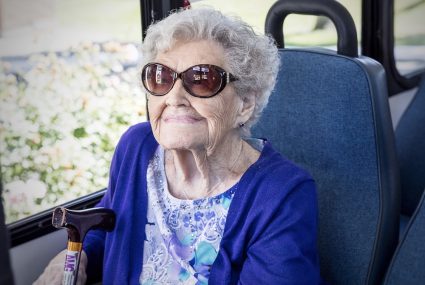As we age, our bodies change. That means our skin changes, too. Our skin begins to weaken as it loses fat and becomes thinner. This allows UV rays to penetrate more deeply. At the same time, our ability to repair damaged cells also diminishes, which raises the risk of the kind of abnormal cell growth that is associated with skin cancer.
This is why it’s extra important for seniors to exercise caution during the sunny spring and summer months. It’s still very important for seniors to get out and enjoy the sun, but they need to exercise caution when it comes to sun exposure. Let’s take a look at a few things seniors can do to stay safe in the sun.
How Seniors Can Enjoy the Sun While Staying Safe
Stay hydrated
When you’re in the sun, it can be easy to get dehydrated. In fact, you might not even notice you’re thirsty until you’re already dehydrated. However, it can be just as easily prevented. Make sure to always have water on hand when you’re outside or in the car. You don’t have to gulp down large amounts at once – just be sure to sip throughout the day. If you tend to sweat more, consider an electrolyte replacement drinks (with salt and potassium) to replenish your sweat.
Cover up
If your skin isn’t exposed to the sun, it won’t burn. The best way to protect against sunburns is to simply cover up when you go outside. Look for breathable fabrics that will help to block the sun and keep you cool. Most tightly woven fabrics will do the trick, but you can also look for special fabrics with UV ratings.
Just make sure you’re dressed to handle the heat, but still keep your skin safe. You don’t want to be too hot, so it’s a good idea to dress in layers. Also wear a hat whenever you’re out in the sun; it will help protect your scalp and face from the sun’s harmful rays.
Use sunscreen
It’s easy to forget to put on sunscreen before you go out, but it’s a vital step in keeping your skin safe from skin cancer. Make it a habit to apply sunscreen whenever you step outside, even if it’s just for a short time. It’s also a good idea to carry it with you in your bag, so you can reapply if you’ve been out for a while. When you choose a sunscreen, SPF 30 rating is the minimum you should use, especially for prolonged exposure.
Keep your peepers protected
Sunglasses are another important part of sun protection. The eyes can be extra sensitive for many seniors, especially those with vision problems. Wearing sunglasses can help shield your eyes from damaging rays. Make sure you choose sunglasses with 100% UV protection, or UV 400 rating, as these are the types of lenses that will actually protect your eyes from the damaging rays of the sun.
Keep cool
It’s easy for seniors to get overheated on hot days. Thankfully, there are a few things you can do to keep cool. Try to find a shady spot to sit when you’re outside and stay out of direct sunlight. On extra hot days, try to limit your time outside and take breaks indoors when you can. You can also try to stay out of the sun during the peak hours of 10am to 4pm when penetration of harmful rays is at its highest.
Look for skin changes
Just one bad sunburn early in life can potentially double the risk of skin cancer as a senior. This is why it’s especially important to watch for changes in the skin for seniors. If you notice any changes, tell your doctor right away. What should you look for? A handy way to remember it is to look for the ABCDEs: look for moles that are Asymmetrical, have irregular Borders, have a strange Color, have a Diameter larger than a pencil eraser, or that have Evolved or changed in any way.

Comments